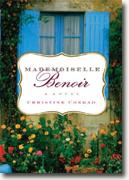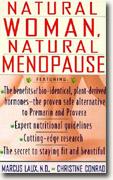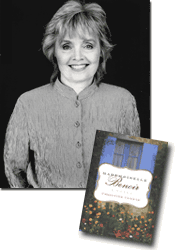An Interview with
Christine Conrad
Interviewer Luan Gaines: What was your inspiration for Mademoiselle Benoir?
Christine Conrad: In 1992 a friend gave me the surprising news that her son, an American male in his thirties living in New York, had decamped for rural France. This fact interested me extremely, as many of us fantasize about such a move, but few of us have the courage to carry it out. So I was always eager for periodic news of his progress: he was restoring an old farmhouse; he was painting seriously; he had a French girlfriend.
Then news came that he had been "adopted" by a quite grand French family. Stories of the family took on an enchanted Jane Austen quality. There were three sisters who painted, sang, and sculpted. They lived in a nineteenth-century château with beautiful parklands and vineyards sprawling down to the river. Then I began to hear of the young man’s budding friendship with one of the sisters, also a painter. And then, seemingly out of the blue, I was told that the young man and the sister had fallen in love and planned to marry. The woman was beautiful, charming, cultured, unmarried . . . but she twenty years older. News of the impending wedding had the effect of a cluster bomb exploding inside the woman’s family, uncovering incendiary layers hidden beneath the surface of this seemingly idyllic French country scene.
Shortly thereafter, on a trip to Paris, I met the newly married couple, and then later traveled to visit them at the woman’s family château. I was completely enthralled by their romance and the extraordinary strife it inspired, and I knew immediately that here was a one-of-a-kind tale, one that resonated for me with that writer’s sensation: This is my kind of story. Even better, it was a story with something for everyone! Given my long screenwriting experience, I was sure it would make a wonderful film, but I also knew that to do justice to the rich complexity and uniqueness of the French setting, it cried out to be a novel.
 Why did you choose the correspondence format for the story of this unusual love affair?
Why did you choose the correspondence format for the story of this unusual love affair?
Once I settled on writing a novel, I spent a lot of time experimenting with form. I tried third person narrative, but I could not make it work for me. I tried a first person narrative from Tim, which worked much better, but how to get in all the other perspectives? I was lucky to have access to correspondence between my friend and her son, and I don’t remember exactly when the ah ha moment arrived, but once I began experimenting with letters, I knew I had my form. A novel in letters ( “epistolary”) is actually a very old form. If you were an English major in college, you would have waded through large tomes like Clarissa by Samuel Richardson. And when it works, this form works spectacularly well, as it creates an immediate intimacy with each character. But it’s not an easy form, and it’s important that it be organic, and that each letter moves the story forward. Some wonderful examples of novels in letter form: The Color Purple, Dracula, and Les Liaisons Dangereuses.
What is Tim Reinhart searching for when he trades in his high-powered New York lifestyle for the relative calm of the French countryside?
Trained as a mathematician, Tim is obviously accustomed to independent thinking and he begins to believe that too much of American life is controlled by what business wants to sell. When he writes to his mother Marjorie, in an attempt to explain his decision to move to rural France, he says, “More than anything I wanted to get off the American treadmill of success with a capital S and shut off the relentless background noise. No cell phones, no constant demands from everywhere in the culture to buy this, buy that, buy anything. I’d like to think of myself as something more than an open mouth with a credit card.” When he decides to put math to the side and concentrate on developing himself as an artist, he believes he needs the solitude and visual stimulation of the French countryside.
Released from his old life, Tim discovers unexpected pleasures in the French approach to food and social discourse. Can you explain this dynamic for those who haven’t had the pleasure?
Tim says, “The more I live here, the more I realize that in France ‘eating’ is not just shoveling some stuff down your throat, but a semi-religious rite, as it gives the double opportunity of good food and good talk, two forms of aesthetic enjoyment the French really value.”
After you spend some time in France – and not just as a tourist, going in and out in less than a week – you become aware of how different French values are from those in the US. In fact, there is a whole industry of books written by Americans transplanted to France to help others negotiate these differences.
The French put an enormous stock in the aesthetics of life – food, drink, beautiful décor, literature, theatre, art, and so on. Maintaining the integrity of their aesthetic traditions, developed over more than a thousand years, is serious business. And this includes preserving their language against Franglais and their food against incursions from McDonalds and the like. Sadly, in the France of 2006, leisurely enjoyment of food and conversation is under pressure by the faster pace of life fueled by global technology. The once sacred two-hour lunch is seriously threatened.
The so-called Francophile, an American who becomes a fanatic fan of all things French, is in many ways looking for an antidote to American values. But paying attention to things French also leads to an understanding of the complexities of European history… about Roman occupation of the area, about pre-historic settlers of thousands of years ago, such as those who created the Lascaux caves, about early Viking settlements, and so on. France was at the epicenter of all these shifts in this part of the world, and when you are in France, the past is always before your eyes.
 Tim complains, “I am completely locked in uncertainty and anxiety about my relationship with Marcelline”. What does Tim’s response to Marcelline tell us about him and his expectations in this new environment? How do the young woman’s demands typify the French approach to family?
Tim complains, “I am completely locked in uncertainty and anxiety about my relationship with Marcelline”. What does Tim’s response to Marcelline tell us about him and his expectations in this new environment? How do the young woman’s demands typify the French approach to family?
Truth be told, Tim operates from an unconscious system of male prerogatives. When he settles into his farmhouse in the Lot Valley, his creative life is his first priority, but female companionship is obviously very welcome to him.
So at first, the relationship between Tim and Marcelline is full of passionate newness…but slowly their underlying personal needs begin to seep through. Marcelline is a “modern” French woman, in that she is trained as a lawyer and lives on her own, but the pull on her by her family to marry and have children is very strong. What becomes clear is that what Tim and Marcelline value and how they want to spend their lives is extremely different, leading to an inevitable tug of war.
Marcelline instinctively views Catherine as a rival, although she cannot articulate her feelings. What could Marcelline have done differently to perhaps change the course of her relationship with Tim?
At first, Marcelline doesn’t think of Catherine as a “romantic” rival, but being around Catherine activates all her insecurities. Marcelline is from a farm family in Southwestern France, Catherine from an aristocratic family with a long history in the region and in Paris. Marcelline is reasonably well-educated, but the gap is still vast, particularly given the strong class consciousness of the French. More than anything, Marcelline is jealous of the easy intellectual rapport between Tim and Catherine.
It’s hard to imagine that Marcelline could ultimately change the course of her relationship with Tim. To even attempt to do so, she would have to deny her own essential needs -- some conscious, some unconscious -- and if somehow she could manage to do this and actually affect a marriage with Tim, over time the result would be disastrous for both of them. From her side, it would amount to “manipulating” him to satisfy her need to have children and live a “French” life. Putting square pegs in round holes when it comes to relationships is a recipe for disaster.
When Tim takes his bike trip with a friend from his days as a student in New York, he realizes how much he has changed, how much of the old life he has put behind him. How significant is this realization to Tim?
At the end of his trip with Brian, Tim writes to Catherine that “Brian is gone from my life. Just like that. After this trip, I will probably never talk to him again.” If the details of this experience are unique to Tim and Brian, given Tim’s radical move to France, Tim is also aware of the inevitable changes that occur between friends by the time they reach their mid-thirties. He believes that “somewhere in their early twenties, people make the unspoken decision to be either a risk-taker or play it safe…” and it became clear to him on the trip that despite his bravado, Brian wasn’t the risk-taker he thought himself to be.
Catherine is just as shocked as Tim to realize that they have fallen in love with each other. How does Catherine overcome her doubts and what does her decision tell us about this character?
If love is the glue of life, and its greatest blessing, it can also scare you to death. Love requires accepting mutuality, and the surrender of at least the illusion that you are completely in control of your own life.
Sometime after I wrote Mademoiselle Benoir, I was rearranging books in my office and came upon Edith Wharton’s The Reef. As much as I loved House of Mirth and Age of Innocence, I could never warm up to the The Reef’s main character, Anna Heath. The man loved her, she apparently loved him; so what was her problem? But thinking about the story after having written Mademoiselle Benoir, I realized that Anna Heath did not have the courage to love… she could not “surrender” herself to the love…she could not step out of her position in society. Catherine struggles with her doubts, but then has the courage to surrender to the love. Anna Heath’s life suffers thereafter from the sadness of what might have been. Edith Wharton, by the way, said that she put most of herself into that book.
 What does Catherine mean by “a love without tyranny”?
What does Catherine mean by “a love without tyranny”?
A “love without tyranny” is something very rare in human life. Domination, control, subtle or unsubtle, can invade even the purest starts between people in love. A need to exert power over a partner, to get your own needs met at their expense, is a constant in love relationships over time. In Catherine’s relationship with Bertrand Denys -- who was much older than she and a famous French philosopher when they met -- Catherine at first deferred to all his needs. She was in effect living his life. But as she became more independent, Betrand would give no ground, wanting to maintain his dominant position without consideration of her changing needs. If love is the “glue of life,” it can also dry up over time if nourishment doesn’t go both ways.
What part do Catherine’s religious beliefs play in her decision to marry Tim? Would she ever have consented to a liaison?
This is a complex question. As a young, beautiful woman in Paris in her twenties in the ‘60s, Catherine maintained an independent life in those times… outside the traditional beliefs of her family. But time brought many changes, and now she has crossed the fifty yard line, so to speak, and lives in the family chateau, and so is more governed by her family’s traditions and values. Living in the country as they do, with its more rigid morality and social codes, Tim and Catherine are under the constant scrutiny of neighbors, and eventually they come to believe that getting married is the best solution for them. Try to imagine Pauline’s reaction had Tim and Catherine decided to just live together!
Resolute in their commitment, the couple marries. Catherine believes that “in the end, life requires continual acts of bravery”. How does this concept define the couple’s future?
It bodes well, but there are no guarantees. As the Buddhists say, if life is suffering, it’s how you deal with inevitable change – and not suffer over your suffering, so to speak – that determines how well your life will go. When Tim’s mother writes to him about the difference in ages between him and Catherine, Tim writes back, “Yes, I’m likely to outlive her. Conversely, I might get hit by a truck tomorrow, and she would be left a widow. Does looking “coldly” at the future mean freezing out the present? So facing life’s challenges as they come, living each day as if it’s the last, is key to preserving and nourishing their marriage.
Is there a follow-up to Mademoiselle Benoir? Or are you working on another project? If so, can you share something about it with us?
So much of the background research I did for Mademoiselle Benoir never entered directly into the text, but I loved doing it, I learned so much from it, and it stayed with me. I gradually began to imagine another book set in France, tentatively titled Two Sisters, but on a much larger canvas. How long will it take? I have no idea!
 Do you have any advice for would-be writers?
Do you have any advice for would-be writers?
I could go on and on with volumes of advice….do you have years to listen?
But as a start, here is what I know is fundamental: Just over my desk, I’ve pasted my daily advice to myself: “Patience is the only skill.”
In my case, the impulse to write came relatively early in life, but success in writing did not come quickly or easily. I wrote a lot and continuously, at the same time working at different careers, and it was only in the Eighties, when I began working as a screenwriter, that I was finally able to earn a living as a writer. So when I talk of patience, I mean patience in the short term, in the medium term, and in the long term. There is no easy or obvious path. If love of another requires “continual acts of bravery,” then pursuing a writing life requires even more bravery, as it is essentially a life without companionship.
A few more thoughts:
You cannot be a writer unless you read, and then learn from your reading. I once met someone who claimed to want desperately to be a writer, and when I asked what they read, they admitted that they didn’t like to read! I came from an essentially non-reading family, but books became my window on the world.
Don’t think there is single way to write. I used to believe that sitting down for four hours a day and churning out 4 pages was what a “real” writer was supposed to do. But I eventually realized, and not painlessly, that this method didn’t work for me. It may take you a while, but you need to trust the unique way you imagination works, and what working habits best suit you.
About “Perfectionism:” When you start out writing, perfectionism can be your worst enemy, to the point of completely freezing you up. But it’s important to learn that “errors” are your allies…because if you don’t start somewhere, there’s nothing to work with, and the so-called “errors” are the path to a better solution. And ultimately you will find that constant rewriting, the very best side of perfectionism, is essential to the good writing.
CHRISTINE CONRAD has worked as the New York City film
commissioner, as an editor in book publishing, as a screenwriter for
motion pictures and television, and as an advocate for women’s health.
Contributing reviewer Luan Gaines interviewed
Christine Conrad, author of Mademoiselle Benoir (see accompanying review), about her book via email for curledup.com. Luan Gaines/2006.





